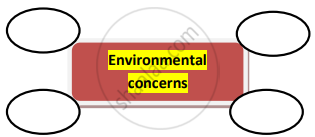Topics
The World since 1991
Key Concepts and Issues since 1991: Globalisation
Key Concepts and Issues since 1991: Humanitarian Issues
Contemporary India: Challenges to Peace, Stability and National Integration
Contemporary India: Good Governance
India and the World
Notes
Important Environmental Concerns:
Some of the important environmental concerns are as follows:
Climate Change:
Greenhouse gas emissions are the main cause of climate change. This has resulted in extreme weather events such as droughts, wildfires, heatwaves and flooding.
Pollution:
Air pollution and climate change are closely linked. Greenhouse gas emissions that are warming the planet are also creating smoggy conditions in major cities that endanger public health.
Deforestation:
Forests are important as they absorb CO2 that would otherwise escape into the atmosphere and worsen global warming. Cutting down trees also threatens animals and humans who rely on healthy forests to sustain themselves.
Carbon dioxide enters the atmosphere through burning fossil fuels (coal, natural gas, and oil), solid waste, trees and other biological materials, and also as a result of certain chemical reactions (e.g., manufacture of cement). Carbon dioxide is removed from the atmosphere (or "sequestered") when it is absorbed by plants as part of the biological carbon cycle. Biodiversity is defined as “the variability among living organisms from all sources including, inter alia, terrestrial, marine and other aquatic ecosystems and the ecological complexes of which they are part; this includes diversity within species, between species and of ecosystems.” Import substitution industrialization (ISI) is a trade and economic policy that advocates replacing foreign imports with domestic production. It is based on the premise that a country should attempt to reduce its foreign dependency through the local production of industrialized products.
Water Scarcity:
As the population increases and climate change causes more droughts, water scarcity is becoming more of an issue. Access to clean, safe drinking water is an important problem faced by the population today.
Loss of Biodiversity:
Loss of biodiversity threatens food security and population health. Climate change is also a major contributor to biodiversity.
The Ministry of Environment, Forest and Climate Change is the nodal agency in the administrative structure of the Central Government for the planning, promotion, co-ordination and overseeing the implementation of India’s environmental and forestry policies and programmes. The primary concerns of the Ministry are the implementation of policies and programmes relating to conservation of the country’s natural resources including its lakes and rivers, its biodiversity, forests and wildlife, ensuring the welfare of animals, and the prevention and abatement of pollution. While implementing these policies and programmes, the Ministry is guided by the principle of sustainable development and enhancement of human well-being.

